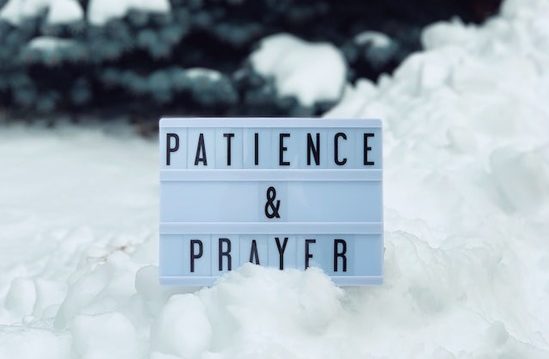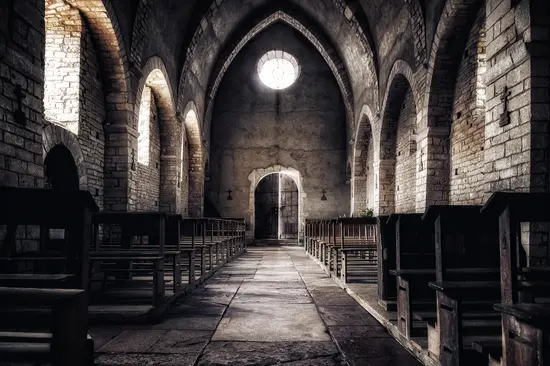The Seven Churches of Revelation and What They Mean
The seven churches were churches that received messages from Jesus Christ through the apostle John while he was exiled on the island of Patmos. These letters are in chapters 2 and 3 of Revelation.
But beyond being literal churches in the cities of the Roman Empire, each of the churches also represents a time period of the church in history, all the way to the end times before Jesus returns.
Here, we’ll give you an overview of each church, what Jesus told the people of that church, and what period the church represents. We’ll look at:
- What the seven churches of Revelation are
- The church of Ephesus
- The church of Smyrna
- The church of Pergamum
- The church of Thyatira
- The church of Sardis
- The church of Philadelphia
- The church of Laodicea
Let’s start with what the seven churches are all about.
What the seven churches of Revelation are
The seven churches in Revelation 2 and 3 are Ephesus, Smyrna, Pergamum, Thyatira, Sardis, Philadelphia, and Laodicea. They were all in the Roman province of Asia (modern-day Turkey).
But these were just a few of the churches in the New Testament times. Christians worshiped in many other towns and cities around the Mediterranean, such as Phillipi, Antioch, Colossae, and Rome.
Why, then, did Jesus send messages to only seven churches?
Jesus must’ve selected these churches because He knew their specific characteristics would symbolize the Christian Church during different time periods in history.
See, the book of Revelation is filled with symbols.
The seven churches are just the first of many sets of seven described in Revelation: seven Spirits, seven candlesticks, seven stars, seven lamps, seven seals, seven horns, seven eyes, seven angels, seven thunders, and seven trumpets—each one symbolic.
For example, the seven stars represent angels, and the seven lampstands represent the churches (Revelation 1:20).
And in the Bible, the number seven itself is a symbol of perfection.1
Thus, each church in Revelation 2 and 3 corresponds chronologically to a period in time, and each problem the church faced represents the problems of God’s people during that corresponding period in history.
Scholars who wrote the Seventh-day Adventist Bible Commentary point out:
“A study of history reveals that these messages are, indeed, applicable in a special way to seven periods that cover the entire history of the church.”2
But even so, these messages also apply to Christians during the various stages of their own walk with God. The messages are relevant to us, helping us be aware of things that will happen in our time (Revelation 1:1).
Let’s dig deeper into each one.
The church of Ephesus

Photo by Osama Saeed on Unsplash
The first of the seven churches is Ephesus, which means “desirable” or “lovely”—an apt description of its spiritual condition. The message to this church is in Revelation 2:1–7.
Ephesus was a powerful city, situated on the western coast of Asia Minor, and it had a Christian congregation founded by the apostle Paul (Acts 19:1–8).
These Christians worked hard to spread the good news of Jesus to those around them. Jesus congratulates them, saying,
“I know your works, your labor, your patience, and that you cannot bear those who are evil…. [A]nd you have persevered and have patience, and have labored for My name’s sake and have not become weary” (Revelation 2:2–3, NKJV).
The church of Ephesus was apparently on fire for God.
Yet it had a problem: the people had become focused on all the beneficial things they were doing and had forgotten their first love for Jesus (Revelation 2:4).
Jesus proposed a solution to help get them back on track. He told them to do three things:
- Remember their love and zeal for God and others
- Repent
- Do what they did at first
In His message to them, Jesus speaks of Himself as “He…who walks in the midst of the seven golden lampstands” (Revelation 2:1, NKJV).
This title has special relevance to Ephesus.
The lampstands alluded back to the sanctuary in the Old Testament, where the high priest would keep the lamps continually burning (Leviticus 24:1–4). Similarly, Jesus is among His church (Revelation 1:20), helping to make sure it doesn’t lose its fire and zeal.
The Ephesian church represented the early Christian age—from the first century to about A.D. 100. These Christians were definitely full of zeal. The book of Acts records many stories that illustrate their passion for Jesus.
For example, Acts 3 records Peter and John, Jesus’ disciples, healing people by God’s power.
And when both Stephen and Paul were brought to trial for their beliefs, neither wavered, preferring stoning rather than giving up their faith (Acts 7:58–60; 14:19).
The gospel spread rapidly, helped by the travels of the apostles. Paul made four separate journeys—missionary trips—around the Mediterranean, preaching and planting churches.
But even in this period, God’s people were at risk of allowing their fervor to die. Only by keeping their focus on Jesus and continuing to walk by faith would they hold onto that deep-seated fervor for God.
Especially when trials and persecution would become stronger.
The church of Smyrna
The message to Smyrna, the persecuted church, is in Revelation 2:8–11. It was one of the two churches that Jesus did not correct.
Instead, He commended the church for remaining strong through persecution, saying that despite their poverty, they were actually rich. This reflects Proverbs 8:10–11, which highlights the wealth that comes from knowing Jesus:
“Receive My [Jesus’] instruction, and not silver, and knowledge rather than choice gold; for wisdom is better than rubies, and all the things one may desire cannot be compared with her” (NKJV).
The name Smyrna means “sweet fragrance” or “myrrh.” Myrrh is an herb that lets out a “fragrant odor” when crushed.3
Similarly, when God’s people at this time experienced crushing persecution, their lives revealed the fragrance and love of Christ (Ephesians 5:2).
And in the midst of their persecution, Jesus had encouragement for Smyrna. He came to them as the “First and the Last, who was dead, and came to life” (Revelation 2:8, NKJV). He reminded them that He was in control of death and life.
He added,
“Do not fear any of those things which you are about to suffer. Indeed, the devil is about to throw some of you into prison, that you may be tested, and you will have tribulation ten days. Be faithful until death, and I will give you the crown of life” (Revelation 2:10, NKJV).
Ten days?
That doesn’t seem very long, but in Bible prophecy, a day stands for one year (Ezekiel 4:5–6). So, Jesus is actually telling them they’ll be persecuted for ten years.
This really happened in history. The Smyrna church prophetically stands for the post-apostolic church that existed from about A.D. 100–313. During this time, the Roman Empire persecuted Christians, imprisoning and murdering scores of them.4
The worst of it came during the tenure of the emperor Diocletian, who reigned from A.D. 303–313—a span of 10 years.5
But after persecution, the Christian church faced even greater danger. Find out about that next.
The church of Pergamum

Photo by Ricardo Cruz on Unsplash
The third church John writes to—Pergamum, or Pergamos—sat on top of a hill near two tributaries of the Caicus River. This could be why the city’s name meant “high” or “elevation.”
John addressed this church in Revelation 2:12–17. Its members had remained faithful to God, even when one of them was martyred in the city.
He did have one problem to correct them about, though: compromise.
In growing their church, the Pergamum Christians had incorporated beliefs of the pagan religions around them:
“But I have a few things against you, because you have there those who hold the doctrine of Balaam, who taught Balak to put a stumbling block before the children of Israel, to eat things sacrificed to idols, and to commit sexual immorality” (Revelation 2:14, NKJV).
Pergamum was a city saturated in idolatry. Temples to Diana, Zeus, and other gods crowded the streets.6 By incorporating pagan practices, the Christians were diluting the pure teachings of Jesus.
In His message to them, Jesus calls Himself “He who has the sharp two-edged sword” (Revelation 2:12, NKJV). The two-edged sword represents the Word of God, which is “living and powerful, and sharper than any two-edged sword” and is “a discerner of the thoughts and intents of the heart” (Hebrews 4:12, NKJV).
He asks the Pergamum Christians to “repent, or else I will come to you quickly and will fight against them with the sword of My mouth” (Revelation 2:16, NKJV).
God’s Word would be the standard of judgment for those who deliberately chose to disobey Him (Revelation 19:15, 21).
The Christian church as a whole went through a time of compromise too. It began after the time of persecution, lasting from about A.D. 313–538.
In A.D. 313, the emperor Constantine legalized Christianity and made it the official religion of Rome.7
You might think this was a good thing.
But it came at a price. To gain converts, the Church began to accept pagan practices, while the pagans joined the church to gain favors. It was a time of compromise—dilution—that led to spiritual decline and a weaker church.
The church of Thyatira

Photo from Unsplash
Thyatira was a city on the banks of the Lycus River that was known for its dyeing and indigo trade. The name Thyatira means “perfume of labor.”
Revelation 2:18–29 describes the situation of the church. They had many good attributes, like love, faith, patience, and wonderful deeds (Revelation 2:19).
But they also had some serious things they needed to work on. John wrote,
“You allow that woman Jezebel, who calls herself a prophetess, to teach and seduce My servants to commit sexual immorality and eat things sacrificed to idols. And I gave her time to repent of her sexual immorality, and she did not repent” (Revelation 2:20–21, NKJV).
This passage is clearly referring back to Jezebel, an evil queen in the Old Testament who promoted idol worship and caused God’s people to turn away from Him (1 Kings 16:29–33).
Here, she represents a corrupt church.
The symbol of a woman has been used to represent God’s people throughout the Bible (Ephesians 5:23; Revelation 19:17).
An immoral woman represents God’s people abandoning Jesus’ teachings. We find this in the book of Hosea, where God compared Hosea’s marriage to a prostitute with His relationship to His people. Prostitution illustrated the unfaithfulness of God’s people to Him (Ezekiel 23:7; Hosea 1:2; 4:10).
In His letter, Jesus says He is the “Son of God, who has eyes like a flame of fire” (Revelation 2:18, NKJV). With this title, He presents Himself as the one who is able to read hearts and execute judgment (Psalm 139:23–24; Revelation 2:23).
The church of Thyatira represents the Church during the Middle Ages. Propelled by state power, the Church held to unbiblical traditions and persecuted groups that disagreed.8
But not all within Thyatira accepted those traditions.
Jesus encouraged “the rest in Thyatira, as many as do not have this doctrine” by telling them to “hold fast what you have till I come” (Revelation 2:24–25, NKJV).
Even during this time of false teaching, some Christians remained faithful and helped turn people back to God’s Word, particularly during the Reformation.
The church of Sardis
In Revelation 3:1–6, we read of Sardis, the dead church. In name, they’re alive, but inside they’re dead.
Sardis, sitting at the base of Mount Tmolus near the river Pactolus, was an old and well-defended city. Externally, the church there appeared to be prosperous, but inwardly, the people were indifferent. The power of God was gone.
Jesus advises them to regain their close connection with God with three instructions: be watchful, hold fast to Jesus, and repent.
He tells them,
“Be watchful, and strengthen the things which remain, that are ready to die, for I have not found your works perfect before God. Remember therefore how you have received and heard; hold fast and repent. Therefore if you will not watch, I will come upon you as a thief, and you will not know what hour I come upon you” (Revelation 3:2–3, NKJV).
Jesus knew that a connection with Him was vital. He is the one who “has the seven Spirits of God and the seven stars” and could revive the spiritually dead church (Revelation 3:1, NKJV). It’s similar to the way the Holy Spirit brought life to the dry bones in Ezekiel’s vision (Ezekiel 37).
Sardis represents the time from the end of the Reformation to right before the Second Great Awakening.9
As new generations came up after the time of the Reformers, they began to stagnate in their faith. Seventh-day Adventist theologian George Burnside describes it this way:
“The reformers were men of God, but their followers, thinking that all was won, settled down to organized religion. Many became state religions supported by government funds.”10
During these years, Christians lapsed into tradition and an indifferent shell of worship as they had before.
But in the midst of this spiritual deadness, some remained true to the Bible and began revivals in the church.
The church of Philadelphia

Photo by Womanizer Toys on Unsplash
Philadelphia, which means “brotherly love,” was located along the Imperial Post Road—an important trade route—and held the only other church to receive no correction from Jesus. Revelation 3:7–13 contains the message that describes this faithful congregation.
Jesus praises them:
“For you have a little strength, have kept My word, and have not denied My name” (Revelation 3:8, NKJV).
Jesus’ name in this letter is “He who is holy, He who is true,” mirroring the Philadelphians’ earnest, unwavering faith (Revelation 3:7, NKJV). It also reveals Jesus’ role as judge (Revelation 6:10).
Despite the vast array of idols and gods in Philadelphia, the Christians there didn’t allow themselves to be distracted.
Because they were so faithful, Jesus makes this promise to them:
“Because you have kept My command to persevere, I also will keep you from the hour of trial which shall come upon the whole world, to test those who dwell on the earth” (Revelation 3:10, NKJV).
He encourages them to hold fast to Him, and those who did would have the name of God written on them.
The church of Philadelphia symbolizes the time of spiritual awakening in the late 1700s to mid-1800s. This was a time when powerful preachers and evangelists revived their congregations, studying the Bible in earnest.
The Millerite Movement, which preached the imminence of the Second Coming, took place during this time period. And the Seventh-day Adventist Church was born soon after.
The church of Laodicea
The last of the seven churches is Laodicea, discussed in Revelation 3:14–22.
Just as the meaning of Laodicea is “judging of the people,” Jesus evaluates the Laodicean church and immediately points out their problem. They weren’t dead or overly zealous in their Christian faith—just lukewarm:
“I know your works, that you are neither cold nor hot. I could wish you were cold or hot. So then, because you are lukewarm, and neither cold nor hot, I will vomit you out of My mouth…. [Y]ou say, ‘I am rich, have become wealthy, and have need of nothing’—and do not know that you are wretched, miserable, poor, blind, and naked” (Revelation 3:15–17, NKJV).
Chilling words.
The Laodicean church would have understood this metaphor of lukewarm spirituality. The city of Laodicea, located at a junction of multiple important trade routes, had a water supply full of sediment. To get clean water, they piped it from hot springs six miles away. By the time the water reached the city, it was lukewarm.11
Likewise, the Laodicean church was no longer full of the warmth of the love of God. And it didn’t realize its true condition.
To remedy this, Jesus said,
“I counsel you to buy from Me gold refined in the fire, that you may be rich; and white garments, that you may be clothed, that the shame of your nakedness may not be revealed; and anoint your eyes with eye salve, that you may see” (Revelation 3:18, NKJV).
These items were symbolic, as mentioned by the Seventh-day Adventist Bible Commentary:12
- The gold refined in the fire is Jesus’ pure truth, faith, and love (1 Peter 1:7).
- The white garments are the righteousness of God (Revelation 19:8).
- The anointing of the eyes with eye salve is the giving of spiritual discernment by the Holy Spirit (1 John 2:27).
Jesus’ title in this letter is fitting. He is “the Faithful and True Witness” (Revelation 3:14, NKJV). He faithfully told them the truth about their condition because they were caught in self-deception.
And He did so because He cared for them:
“As many as I love, I rebuke and chasten” (Revelation 3:19, NKJV).
This church characterizes the church of the end times, shortly before Jesus returns. God’s people at this time in history are living during the time of the Investigative Judgment right before the Second Coming.
Yet they’re neither religiously on fire nor spiritually dead. They are somewhere in between, thinking that they’re alright when they’re really not.
Because we’re living in the end times before Jesus’ return, we could easily fall into this lukewarmness.
But Jesus doesn’t give up on us.
He stands at the door of our hearts. He won’t force Himself in, but if we choose to let Him, He will gladly enter and make us into overcomers (Revelation 3:20–21).
The lessons of the seven churches still apply to us today
The fact that God gave messages to seven churches in the book of Revelation is significant. It is God’s perfect number, repeated throughout the Bible.
It reflects His perfect plan for history and humanity.
Even before the time periods took place, God had it all figured out—and provided the instructions, counsel, and warnings that His people would need at various times.
Though each church symbolizes a specific period of time, there are elements of each church in any given time period.
And the corrections and praises apply to our own lives and churches just as much as they did in ages past.
These messages challenge us to evaluate our own lives and allow the Holy Spirit to point out areas in which we’re struggling. At the same time, they remind us of how much Jesus cares about us and wants us to grow in Him and be prepared for His coming.
- White, Ellen, Acts of the Apostles, pp. 585–586. [↵]
- Seventh-day Adventist Bible Commentary, vol. 7, entry for Revelation 1:11. [↵]
- Bunch, Taylor, The Seven Epistles of Christ, pp. 130–131. [↵]
- Arnold, Jack, “Church History: Persecution by the State: A.D. 60-313, Early Church History, Part 9,” Third Millennium Magazine. [↵]
- “The Great Persecution,” If Gathering.com, IF Gathering, Accessed 9 February 2023, https://www.ifgathering.com/ifequip/studies/anno-domini-i/the-great-persecution/. [↵]
- “Pergamos,” The Cyclopedia of Biblical, Theological, and Ecclesiastical Literature.[↵]
- Denova, Rebecca, “Constantine’s Conversion to Christianity,” World History Encyclopedia.[↵]
- Mark, Joshua, “Six Great Heresies of the Middle Ages,” World History Encyclopedia. [↵]
- “Sardis—The Dead Church,” Lineage Journey. [↵]
- Burnside, George, Revelation’s Wonders Unfolded, p. 53. [↵]
- Keeth, Crickett, “Laodicea—The Lukewarm Church,” Bible.org. [↵]
- Seventh-day Adventist Bible Commentary, vol. 7, p. 965. [↵]
Questions about Adventists? Ask here!
Find answers to your questions about Seventh-day Adventists
More Answers
The Health Benefits of Fresh Air You Should Know About
The Health Benefits of Fresh Air You Should Know About“When you can’t breathe, nothing else matters,” the American Lung Association tells us. And while that’s true, the kind of air you’re breathing will determine the health benefits you experience. Breathing fresh...
What Do Seventh-day Adventists Choose to Eat?
What Do Seventh-day Adventists Choose to Eat?Food blogs overwhelm the internet; food fads are all the rage; and copycat and healthy versions of food are the subject of many a get-together. Eating—and eating the best way—is a big deal. And everybody has a different...
10 Incredible Ways Sunlight Can Improve Your Health
10 Incredible Ways Sunlight Can Improve Your HealthAre you concerned about sunlight’s negative effects? You might be the one who lathers on the sunscreen and covers up when you go outside. Or maybe you avoid being outside as much as possible. You might be surprised,...
Why Is Water So Important?
Why Is Water So Important?We all know that water is a substance we can’t live without. It quenches our thirst and keeps us hydrated on the inside. And it’s necessary for hygiene and cleansing on the outside too. But did you know that the cleansing properties of water...
Ellen White’s Writings and the Adventist Health Message
Seventh-day Adventists are known for their emphasis on healthy living. And Ellen G. White was a significant influence in the development of this priority and practice among Adventists.
Health Clinics
Ellen White and Adventist Healthcare—Ahead of Their Time Medical care in the mid-1800s was primitive, to say the least. Basic concepts we take for granted—such as proper handwashing or recognizing the dangers of bloodletting—were nonexistent. And doctors often had...
What Did Ellen White Teach about Vegetarianism?
What Did Ellen White Teach about Vegetarianism?One thing you might have heard about Seventh-day Adventists is their emphasis on a vegetarian lifestyle. If you’re wondering why that is, it goes back to our church’s humble beginnings: As Adventists studied the Bible,...
How Ellen White’s Teachings Can Improve Your Health
How Ellen White’s Teachings Can Improve Your Health Healthcare in the nineteenth century was said to leave “more disease than it took away” with its use of bloodletting and “medicines” like mercury and arsenic.1 As people questioned these methods, new approaches...
Change Your Perspective on Life with These 5 Mindsets
5 Biblical Mindsets to Change Your Life for the Better Sometimes, life is just plain hard. There’s no way around it. So would thinking about things differently really change anything? Our perspective on life, and everything it throws at us, affects more than we’re...
Bible Promises for When You’re Worried or Fearful
Bible Promises for When You’re Worried or Fearful The Bible is full of beautiful promises that can comfort us in a variety of situations. They can give us hope when we are hopeless, make us feel grateful for God’s love, and comfort us when we’re grieving or suffering....
12 Practical Ways to Overcome Worry
12 Practical Ways to Overcome Worry DISCLAIMER: This content is for informational purposes only. It does not constitute any professional medical advice and is not intended as a substitute for professional mental health therapy. It’s easy to get stuck in a cycle of...
How the Bible Talks About Worry, Fear, and Anxiety
How the Bible Talks About Worry, Fear, and Anxiety Worry and fear are the ingredients of anxiety. It’s easy to see how the world isn’t perfect—and the anticipation of a bad event or experience (that may or may not even happen) can end up draining the peace and...
How to Calm Anxious Thoughts, Using the Bible
How to Calm Anxious Thoughts, Using the Bible You were expecting a phone call from your daughter half an hour ago, and she still hasn’t called. She’s also not answering your calls. You feel your heart thumping as your thoughts race: What if she’s been in a car...
What You Should Know About the Adventist Health Studies
What You Should Know About the Adventist Health StudiesYou may have heard that Seventh-day Adventists care about health. But what you may not know is that Adventists have been the subjects of long-term research into lifestyle and health. Since 1958, researchers from...
Benefits of Sunlight
Yes, There Are Health Benefits of SunlightDespite the bad reputation it’s gotten, sunlight is generally associated with positivity, as shown by songs like “You Are My Sunshine,” or phrases that refer to delightful people as having a “sunny disposition.” There’s a...
Why Your Body Needs Rest for Optimal Health
Why Your Body Needs Rest for Optimal HealthStruggling to think straight? Wondering why you can’t remember that important tidbit you heard earlier today? Feeling like your emotions are about to explode? These are just some of the symptoms that can reveal your need for...
The Seventh-day Adventist Diet: One of Our Key Longevity Secrets
The Seventh-day Adventist Diet: One of Our Key Longevity SecretsOats, avocados, lentils, tofu—probably not what you first think of in a standard American diet. But if you show up at the home of an Adventist, chances are you may be served one of these staples. Out of a...
Why You Need Fresh Air
Why You Need Fresh Air“When you can’t breathe, nothing else matters,” the American Lung Association tells us. We couldn’t agree more! Breathing in clean air is an essential part of caring for our bodies, which God has given us. Together with other health principles,...
Sabbath Meal
Everything You Need to Know About Sabbath MealsFor Seventh-day Adventists, sharing a Sabbath meal with friends and family is one of the most special and memorable parts of the Sabbath. That’s why we want to share with you all about Sabbath meals and why they’re such a...
Adventists and Healthy Living
Adventists and Healthy LivingWhat’s the Adventist “Health Message” All About? One thing Seventh-day Adventists are known for is their emphasis on living healthy lives. Since our bodies are living temples of the Holy Spirit (1 Corinthians 6:19, 20), we strive to stay...
Water’s Importance—Physical Benefits and Spiritual Applications
Water’s Importance—Physical Benefits and Spiritual Applications We all know that water is a substance we can’t live without. Not only does it quench our thirst and keep us hydrated from the inside, but it’s necessary for hygiene and cleansing on the outside as well....
How Important is a “Day of Rest?”
How Important is a “Day of Rest?” Why God Created a Day for Downtime by Martin Casper Do you ever experience the feeling of complete overload? Do you feel like the only way you can get ahead is by slamming it 24/7? I hear these types of comments more and more...
7 Reasons Why a Day of Rest is Important
7 Reasons Why a Day of Rest is ImportantWe live in a fast-paced world. It seems as if success is measured in how much you can do in a short amount of time. (Extra points for the service or product that is available 24/7). The idea that we will be more successful if we...
How do Adventists choose what to eat?
How do Adventists choose what to eat?Every day, parents go through the ritual of getting their kids to eat what is healthy and good while trying to steer them away from what can hinder the growth of their developing bodies. Nutritionists work with their clients to...
How Can I Have a Better Marriage?
Is it possible to have a happy marriage?
How do Adventists make movie and music choices?
How do Adventists make movie and music choices?Cinema has come a long way since the first clips of motion pictures came to light in 1878. As the decades rolled on, film and music producers have created rivers of movies and albums for the masses. Today, watching movies...
Why are many Adventists Vegetarian?
Why are many Adventists Vegetarian?The diet intended for man is outlined in Genesis 1:29, “And God said, ‘See, I have given you every herb that yields seed which is on the face of all the earth, and every tree whose fruit yields seed; to you it shall be for food.’”...
Didn’t find your answer? Ask us!
We understand your concern of having questions but not knowing who to ask—we’ve felt it ourselves. When you’re ready to learn more about Adventists, send us a question! We know a thing or two about Adventists.






















